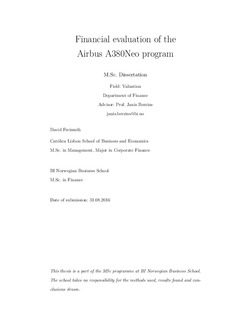Financial evaluation of the Airbus A380Neo program
Master thesis
Permanent lenke
http://hdl.handle.net/11250/2442498Utgivelsesdato
2016Metadata
Vis full innførselSamlinger
- Master of Science [1621]
Sammendrag
Executive summary
Topic
Financial evaluation of the Airbus A380Neo program
Abstracta
(Executive summary in Portuguese, requirement by Católica Lisbon)
Num futuro próximo, a fabricante de aviões Airbus terá que tomar a decisão
sobre o investimento num A380Neo, um produto sucessor do maior avião de
passageiros do mundo, o A380. O custo total do A380 foi de aproximadamente
25 biliões de euros, porém apenas 319 encomendas foram feitas, das quais 193
já foram entregues até Junho de 2016. Na realidade, o mercado de aeronaves
de fuselagem larga não se desenvolveu como a Airbus antecipava. Durante a
década passada as companhias aéreas estavam especialmente interessadas em
aeronaves de fuselagem larga de pequena e media dimensão, que conseguem
operar com apenas dois motores mais económicos, têm uma maior flexibilidade
operacional e têm menos risco na fase de implementação. O programa
A380Neo teria um custo estimado de 3 biliões de euros e o avião poderia estar
disponível já em 2021. Devido à sua elevada especialização, esta aeronave tem
uma procura limitada e está sujeita a margens reduzidas. Consequentemente,
não existindo uma real vantagem competitiva para as companhias áreas
estas não estarão dispostas a pagar um valor superior para adquirir este novo
modelo. De uma análise baseada no fluxo de caixa descontado, conclui-se
que na atual conjetura económica não é financeiramente vantajoso incorrer
no investimento do A380Neo. A utilização do modelo de opções reais permite
concluir que existe a possibilidade de o investimento ter um VPL positivo caso
o adiar do mesmo não signifique incorrer em custos adicionais. No entanto,
mesmo com um VPL negativo, os interesses políticos ainda podem resultar
numa reconsideração favorável ao investimento.
(Translated by Joana Marcelino) Executive summary
In the foreseeable future aircraft manufacturer Airbus will face the decision
on investing into the A380Neo, a successor product from the world’s largest
passenger aircraft, the A380. The A380’s total costs were approximately e 25
billion, however only 319 orders were gained of which 193 are already delivered
until June 2016. The market did not develop as Airbus anticipated towards
large wide body aircrafts. In the past decade airlines were much more interested
in small and medium wide body aircrafts, which achieve with just two engines
better economics, have a higher operational flexibility and are less risky to
deploy. The A380Neo program would cost an estimated e 3 billion and the
plane could be available as early as 2021.
Due to its high specialization the aircraft faces limited demand while being
subject to low margins, as it fails to provide most airlines with a competitive
advantage thereby not justifying any willingness to pay a premium for the jet.
A discounted cash flow valuation results’ that it is in the current market environment
not financially justifiable to commit to the A380Neo investment.
A real-option valuation shows that postponing the decision and holding the
out-of-the-money call option is only optimal for Airbus if costs associated with
waiting are low. Consequently, Airbus should not decrease the production rate
in order to win time over the decision. Due to political interests, a revamping
of the series is still likely even if the project will be a negative NPV investment.
Beskrivelse
Masteroppgave(MSc) in Master of Science in Finance - Handelshøyskolen BI, 2016
